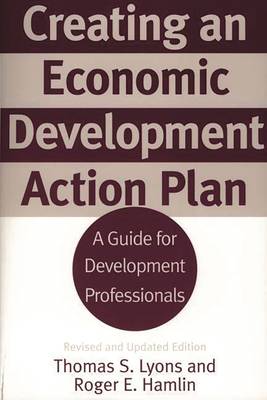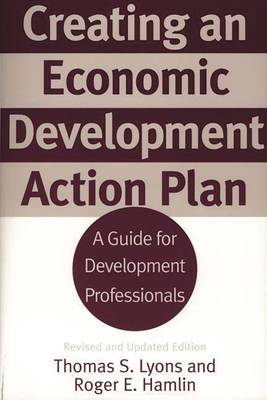
- Retrait gratuit dans votre magasin Club
- 7.000.000 titres dans notre catalogue
- Payer en toute sécurité
- Toujours un magasin près de chez vous
- Retrait gratuit dans votre magasin Club
- 7.000.0000 titres dans notre catalogue
- Payer en toute sécurité
- Toujours un magasin près de chez vous
Creating an Economic Development Action Plan
A Guide for Development Professionals Revised and Updated Edition
Thomas S Lyons, Roger E HamlinDescription
Despite strong U.S. and Canadian economies, economic development remains an important local governmental function, partly to alleviate the persistent poverty that plagues some areas and partly to compete with the activities of neighboring local governments. Those cities, metropolitan areas, rural regions, and states that do not plan effectively lose the battle for economic survival. Local economic development has become a complex and challenging field, with increasing numbers of planners specifically trained for the task. Providing a useful guide for planners and students of planning, this revised and updated edition of Lyons and Hamlin's 1990 book offers a framework for formulating an economic development plan for a local community.
Stating that economic development planning continues to focus too narrowly on job creation at the expense of long-term goals, the authors focus on the secondary and long-term effects of local development activities. Job creation, they claim, should be the end product of a well-considered, comprehensive, rational approach to economic development. The book looks at the objectives of economic planning, offering a broad conception of them, and considers the information needed to plan effectively. following a discussion of public-private partnership tools in the U.S., the book shows how to translate objectives and data into a program of action, then closes the loop of the planning cycle with a description of program evaluation.Spécifications
Parties prenantes
- Auteur(s) :
- Editeur:
Contenu
- Nombre de pages :
- 208
- Langue:
- Anglais
Caractéristiques
- EAN:
- 9780275968090
- Date de parution :
- 30-03-01
- Format:
- Livre broché
- Format numérique:
- Trade paperback (VS)
- Dimensions :
- 155 mm x 234 mm
- Poids :
- 308 g

Les avis
Nous publions uniquement les avis qui respectent les conditions requises. Consultez nos conditions pour les avis.






